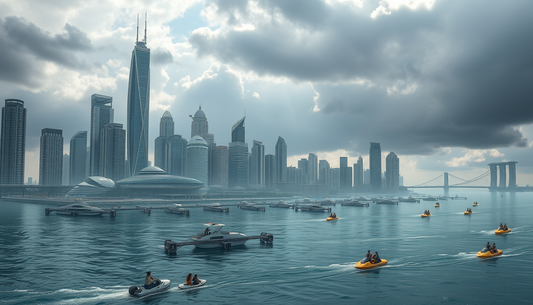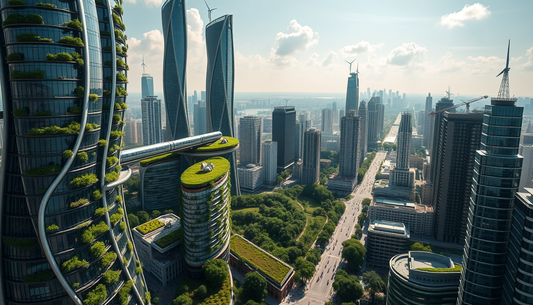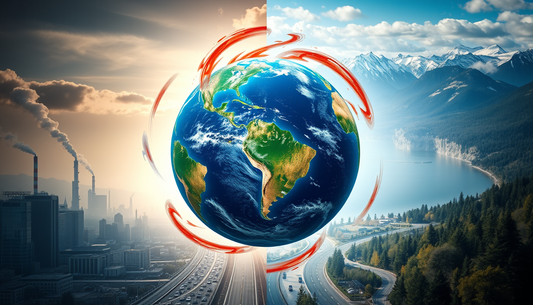Our planet is facing an unprecedented challenge: climate change. This phenomenon, mainly caused by human activities, is having an increasingly evident impact on our daily lives and on the balance of the entire Earth's ecosystem. The time has come to fully understand the causes of this phenomenon and to act responsibly to preserve our precious environment.
Human Footprint on Climate
One of the main factors contributing to climate change is the emission of greenhouse gases, especially carbon dioxide (CO2), methane and nitrous oxide. These substances, released mainly through the burning of fossil fuels, intensive agriculture and deforestation, trap heat in the atmosphere, causing an increase in the average global temperature.
The impact of human activities on the climate is evident in several areas:
Fossil Energy
The massive use of fossil fuels, such as coal, oil and natural gas, for electricity generation and transportation, is one of the main sources of greenhouse gas emissions. This energy model, inherited from the Industrial Revolution, has allowed unprecedented economic development, but at the cost of serious environmental damage.
Intensive Agriculture
Modern agriculture, based on the use of chemical fertilizers, pesticides and intensive livestock farming, contributes significantly to greenhouse gas emissions, especially through the production of methane and nitrous oxide. In addition, deforestation to make room for new crops and pastures reduces the carbon absorption capacity of natural ecosystems.
Urbanization and Transport
The growth of urban areas and the increase in vehicular traffic, especially that related to private transport, generate a high amount of CO2 emissions and other air pollutants, with negative consequences on air quality and people's health.
The Effects of Climate Change
The consequences of climate change are already visible in different parts of the world and are expected to be even more serious in the future. Among the most worrying effects we find:
Rising Temperatures
Rising global average temperatures are causing glaciers and poles to melt, resulting in rising sea levels and the risk of flooding coastal areas. In addition, increasingly intense and frequent heatwaves are putting ecosystems and human health to the test.
Changes in Weather Regimes
Precipitation patterns and seasonal distribution are undergoing profound changes, with an increase in extreme weather events such as droughts, floods, hurricanes and storms. These climate changes have a devastating impact on agriculture, water availability and biodiversity.
Loss of Biodiversity
Global warming, pollution and the destruction of natural habitats are causing an alarming decline in biodiversity, with the risk of extinction of numerous animal and plant species. This phenomenon endangers the balance of ecosystems and the provision of essential services for humanity.
Towards a Sustainable Future
In the face of this global challenge, it is essential that all of us, as individuals, communities and nations, commit to taking immediate and concrete measures to combat climate change. Some of the key actions to be taken are:
Energy Transition
Promote the use of renewable energy sources, such as solar, wind and hydroelectric, to drastically reduce greenhouse gas emissions related to energy production. Invest in more efficient technologies and energy efficiency programs for buildings.
Sustainable Agriculture
Adopt more environmentally friendly agricultural practices, such as organic farming, crop rotation and reduced use of chemical fertilizers and pesticides. Encourage local and zero-mile production to reduce transport-related emissions.
Sustainable Mobility
Encourage the use of low-emission transport, such as bicycles, electric vehicles and public transport. Invest in sustainable mobility infrastructure and promote urban planning policies that reduce the need for car travel.
Education and Awareness
Promote environmental education programs, especially in schools, to raise awareness among new generations about the importance of adopting more sustainable lifestyles. Encourage dialogue and collaboration between citizens, businesses and institutions to find innovative and shared solutions.
Climate change is one of the most urgent and complex challenges of our time. However, if we act in a coordinated and responsible way, we can still reverse the trend and build a more sustainable future for ourselves and for future generations. Each of us has the power to make a difference, through conscious choices and a constant commitment to the protection of our precious planet.







